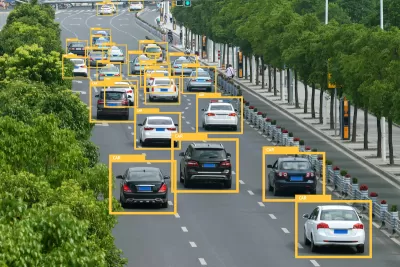AI could automate many urban systems, but that may not mean it’s a good idea.

In an opinion piece in The Conversation, Federico Cugurullo cautions against letting artificial intelligence take too much control of our cities. As Cugurullo explains, the emerging field of AI urbanism differs from ‘smart cities’ that use data to manage urban services. “AI urbanism represents a new way of shaping and governing cities, by means of artificial intelligence (AI). It departs substantially from contemporary models of urban development and management.”
In other words, “AI urbanism does not simply quantify, it tells stories, explaining why and how certain events take place.” Yet, “as the recent example of ChatGPT has made clear, AI can produce a detailed account, without grasping its meaning.”
AI systems bring us closer to sci-fi worlds in which, for example, technology predicts where crime might happen. “This might save our city managers some time, given AI’s extraordinary velocity in analysing large volumes of data, but the price that we are paying in terms of social justice is enormous.”
Some drawbacks to AI pointed out by Cugurullo include its voracious energy consumption and demonstrated discrimination in housing and real estate that perpetuates historical patterns. Meanwhile, the more autonomous we make cities, the less control we have, Cugurullo claims.
“As the autonomy of AI grows, ours decreases and the rise of autonomous cities risks severely undermining our role in urban governance. A city run not by humans but by AIs would challenge the autonomy of human stakeholders, as it would also challenge many people’s wellbeing.”
FULL STORY: AI could make cities autonomous, but that doesn’t mean we should let it happen

Maui's Vacation Rental Debate Turns Ugly
Verbal attacks, misinformation campaigns and fistfights plague a high-stakes debate to convert thousands of vacation rentals into long-term housing.

Planetizen Federal Action Tracker
A weekly monitor of how Trump’s orders and actions are impacting planners and planning in America.

San Francisco Suspends Traffic Calming Amidst Record Deaths
Citing “a challenging fiscal landscape,” the city will cease the program on the heels of 42 traffic deaths, including 24 pedestrians.

Defunct Pittsburgh Power Plant to Become Residential Tower
A decommissioned steam heat plant will be redeveloped into almost 100 affordable housing units.

Trump Prompts Restructuring of Transportation Research Board in “Unprecedented Overreach”
The TRB has eliminated more than half of its committees including those focused on climate, equity, and cities.

Amtrak Rolls Out New Orleans to Alabama “Mardi Gras” Train
The new service will operate morning and evening departures between Mobile and New Orleans.
Urban Design for Planners 1: Software Tools
This six-course series explores essential urban design concepts using open source software and equips planners with the tools they need to participate fully in the urban design process.
Planning for Universal Design
Learn the tools for implementing Universal Design in planning regulations.
Heyer Gruel & Associates PA
JM Goldson LLC
Custer County Colorado
City of Camden Redevelopment Agency
City of Astoria
Transportation Research & Education Center (TREC) at Portland State University
Jefferson Parish Government
Camden Redevelopment Agency
City of Claremont





























